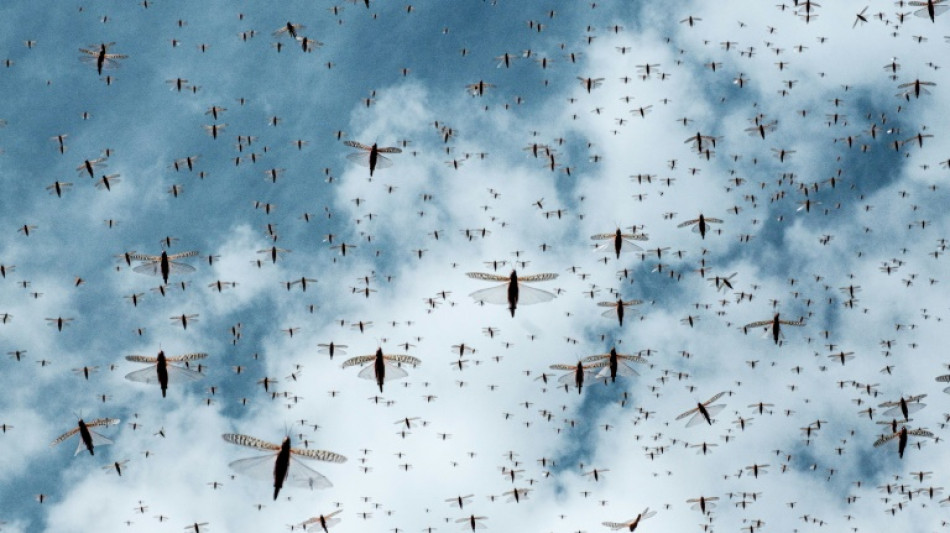
-
 Osimhen, Mbeumo potential key figures in African World Cup play-offs
Osimhen, Mbeumo potential key figures in African World Cup play-offs
-
Tanzania politicians in shock as cabal takes over after massacre

-
 Prague cathedral's long-awaited organ to pipe up in 2026
Prague cathedral's long-awaited organ to pipe up in 2026
-
Australia's Hazlewood gets all-clear after Ashes scare but Abbott ruled out

-
 Migrant workers in Romania fear wave of hate fuelled by far right
Migrant workers in Romania fear wave of hate fuelled by far right
-
DR Congo ex-rebel leader Lumbala's war crimes trial opens in Paris

-
 Turkey says military plane crash in Georgia killed all 20 onboard
Turkey says military plane crash in Georgia killed all 20 onboard
-
Renewables outpace fossil fuels despite US policy shift: IEA

-
 India bank on formidable home Test record in South Africa series
India bank on formidable home Test record in South Africa series
-
Australia's Hazlewood in injury scare ahead of first Ashes Test

-
 No ordinary Joe: Stokes backs Root to fire in Australia
No ordinary Joe: Stokes backs Root to fire in Australia
-
Humans can no longer tell AI music from the real thing: survey

-
 House vote likely Wednesday on ending US government shutdown
House vote likely Wednesday on ending US government shutdown
-
Sixers edge Celtics while Thunder reach NBA-best 11-1

-
 Cambodia's Prince Group denies link to scams after asset seizures
Cambodia's Prince Group denies link to scams after asset seizures
-
Stokes bats away criticism of England's Ashes preparations

-
 Russia loses legal bid to build embassy next to Australian parliament
Russia loses legal bid to build embassy next to Australian parliament
-
Ethiopia's invasive prosopis tree chokes livelihoods and land

-
 'We're already living in science fiction': The neurotech revolution
'We're already living in science fiction': The neurotech revolution
-
Ousted Gabon leader's wife and son sentenced to 20 years for graft

-
 Asian markets up on hopes over shutdown deal, rate cut
Asian markets up on hopes over shutdown deal, rate cut
-
Bangladesh's liquor industry a surprising success

-
 Nepal's war victims watch political changes with fragile hope
Nepal's war victims watch political changes with fragile hope
-
France aim to secure World Cup place as Paris marks attacks anniversary

-
 Russia jails teen musician over anti-war street songs for third time
Russia jails teen musician over anti-war street songs for third time
-
Demand for air con set to triple by 2050, warns UN

-
 Trump claims 'very big victory' as shutdown vote nears
Trump claims 'very big victory' as shutdown vote nears
-
Indigenous protesters clash with security at COP30 summit in Brazil

-
 France warns over Caribbean 'instability' as G7 talks open
France warns over Caribbean 'instability' as G7 talks open
-
Brazil tries to avoid climate bust up at COP30 summit

-
 Empire Metals Limited Announces Diamond Drilling Ahead of Pilot-Scale Testwork
Empire Metals Limited Announces Diamond Drilling Ahead of Pilot-Scale Testwork
-
Evotec Receives Milestone Payment from Bristol Myers Squibb Following IND Acceptance in Strategic Protein Degradation Partnership

-
 ZOQQ Expands Its Enterprise Fintech Platform to Empower Global Business Growth Through Seamless Multi-Currency, Card, and Cross-Border Payment Solutions
ZOQQ Expands Its Enterprise Fintech Platform to Empower Global Business Growth Through Seamless Multi-Currency, Card, and Cross-Border Payment Solutions
-
Ethiopia set to host UN's 2027 climate summit, 2026 undecided

-
 Close Zelensky ally accused of orchestrating major graft scheme
Close Zelensky ally accused of orchestrating major graft scheme
-
'Trump is temporary': California governor Newsom seizes COP30 spotlight

-
 US stocks end mostly higher despite drop in Nvidia
US stocks end mostly higher despite drop in Nvidia
-
Arrival of US aircraft carrier fuels Venezuelan fears of attack

-
 Iraqi voters turn out in numbers as region watches on
Iraqi voters turn out in numbers as region watches on
-
Pakistan upstage Sri Lanka in first ODI as Agha and Rauf shine

-
 Macron warns any planned West Bank annexation a 'red line'
Macron warns any planned West Bank annexation a 'red line'
-
BBC must fight, says outgoing chief as Trump threatens to sue

-
 UN aid chief hails talks with Sudan army leader
UN aid chief hails talks with Sudan army leader
-
Mellon Blue diamond sells for $25.6 million

-
 Google unveils $6.4 bn investment in Germany
Google unveils $6.4 bn investment in Germany
-
US aircraft carrier in Latin America fuels Venezuelan fears of attack

-
 For many Syrians, Sharaa's US visit marks new beginning
For many Syrians, Sharaa's US visit marks new beginning
-
Monumental art displayed in shade of Egypt's pyramids

-
 Stocks mixed as tech titans struggle
Stocks mixed as tech titans struggle
-
California governor Newsom slams Trump at COP30


Scientists find chemical that stops locust cannibalism
Plagues of locusts that darken the skies and devastate all things that grow have been recorded since Biblical times, and today threaten the food security of millions of people across Asia and Africa.
But a new finding reported Thursday -- of a pheromone emitted by the insects to avoid being cannibalized when in a swarm -- could potentially pave the way to reining in the voracious pests.
Study leader Bill Hansson, director of the Max Planck Institute's Department of Evolutionary Neuroethology, told AFP that the new paper, published in Science, built on prior research that found swarms are directed not by cooperation -- but actually the threat of consumption by other locusts.
While repulsive to modern humans, cannibalism is rife in nature -- from lions that kill and devour cubs that are not theirs, to foxes that consume dead kin for energy.
For locusts, cannibalism is thought to serve an important ecological purpose.
Migratory locusts (Locusta migratoria) occur in different forms and behave so differently that they were, until recently, thought to be entirely different species.
Most of the time, they exist in a "solitary" phase keeping to themselves and eating comparatively little, like timid grasshoppers.
But when their population density increases due to rainfall and temporarily good breeding conditions, which is followed by food scarcity, they undergo major behavioral changes due to a rush of hormones that rev them up, causing them to aggregate in swarms and become more aggressive.
This is known as the "gregarious" phase and it's thought the fear of cannibalism helps keep the swarm moving in the same direction, from an area of lower to higher food concentration, according to 2020 research by Iain Couzin of the Max Planck Institute for Animal Research.
Hansson explained that "locusts eat each other from behind."
"So if you stop moving, you get eaten by the other, and that got us thinking that almost every animal who is under threat has some kind of countermeasure."
In painstaking experiments that took four years to complete, Hansson's team first established that cannibalism rates did indeed increase as the number of "gregarious" locusts kept in a cage went up, proving in the lab what Couzin had observed in the field in Africa (the triggering point was around 50 in a cage).
Next, they compared the odors emitted by solitary and gregarious locusts, finding 17 smells produced exclusively during the gregarious phase.
Of these, one chemical, known as phenylacetonitrile (PAN), was found to repel other locusts in behavioral tests.
PAN is involved in the synthesis of a potent toxin sometimes produced by gregarious locusts -- hydrogen cyanide -- so emitting PAN appeared to fit as the signal to tell others to back off.
- Genome editing -
To confirm the finding, they used CRISPR editing to genetically modify locusts so they could no longer produce PAN, which in turn made them more vulnerable to cannibalism.
For further confirmation, they tested dozens of the locusts' olfactory receptors, eventually landing on one that was very sensitive to PAN.
When they gene edited locusts to no longer produce this receptor, the modified locusts became more cannibalistic.
Writing in a related commentary in Science, researchers Iain Couzin and Einat Couzin-Fuchs said the discovery helped shed light on the "intricate balance" between the mechanisms that cause migratory locusts to group together versus compete with one another.
Future methods of locust control could therefore use technology that tips that delicate balance towards more competition, but Hansson cautioned: "You don't want to eradicate the species."
"If we could diminish the size of the swarms, steer them to areas where we are not growing our crops, then a lot could be gained," he added.
B.Finley--AMWN
